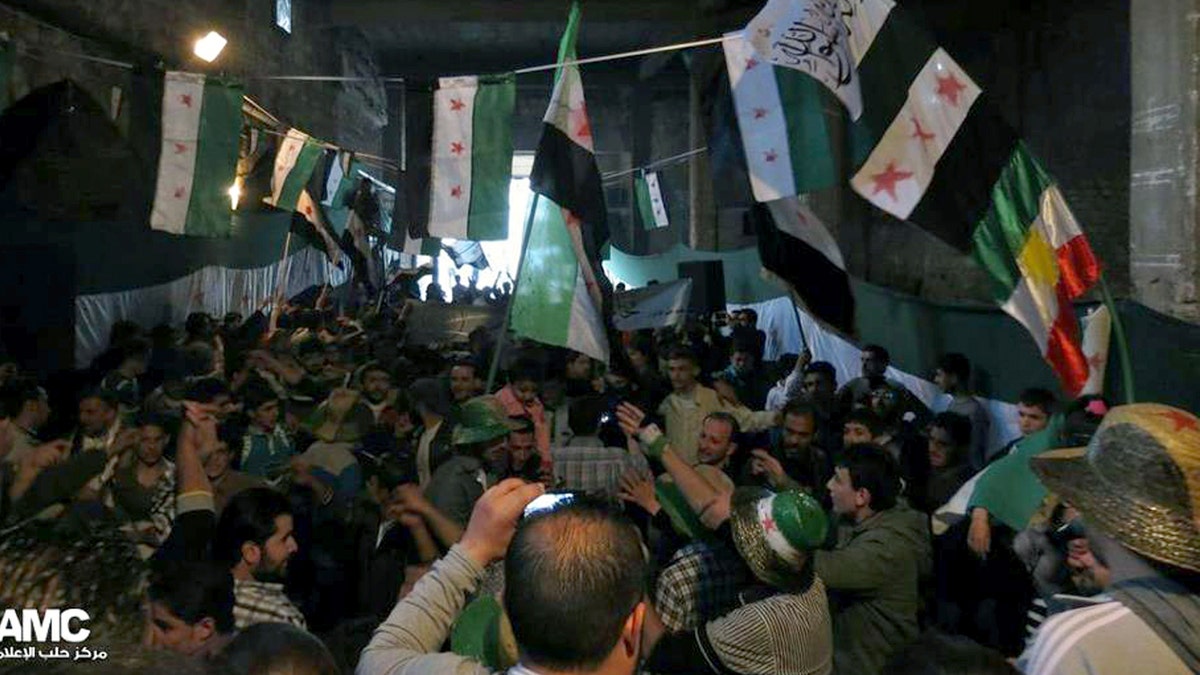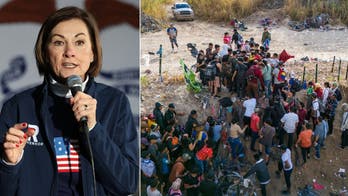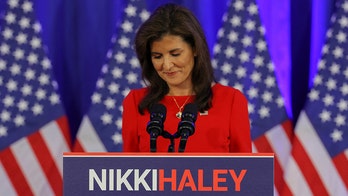
FILE: aPRIL 17, 2013: Anti-Syrian regime protesters holding Syrian revolution flags during a rally. The image provided by Aleppo Media Center AMC has been authenticated based on its contents and other reporting. (AP)
The United States is providing Syrian rebels with $123 million in new nonlethal aid that may include body armor and other types of supplies that haven't been part of the assistance package in the past.
The additional money will double the nonlethal assistance to the Syrian opposition as well as increase humanitarian aid. The nonlethal aid could include armored vehicles, night vision goggles and advanced communications equipment.
Foreign ministers from the main supporters of the rebels trying to topple the Syrian government were meeting in Istanbul over the weekend to increase pressure on Syrian President Bashar Assad to step down. The United Nations estimates that the fighting in Syria has killed more than 70,000 people.
"The stakes in Syria couldn't be more clear: chemical weapons, the slaughter of people by ballistic missiles and other weapons of huge destruction, the potential of a whole country ... being torn apart into enclaves, the potential of sectarian violence," U.S. Secretary of State John Kerry said in a statement.
"This bloodshed needs to stop and that's what brought us here tonight on Saturday and a very early Sunday morning to talk about the possibilities for peace and transition," Kerry said.
In a joint statement, the foreign ministers said they welcomed the Syrian National Coalition's "firm rejection of extremism and its commitment not to use chemical weapons" and cited those commitments in agreeing to enhance and expand support for all coalition institutions.
The foreign ministers said they recognized the "need to change the balance of power on the ground" and, in looking at the current flow of military assistance, welcomed the additional pledges and commitments to further increase the support to the Supreme Military Council. The head of the council provided a military briefing during the meeting.
Syrian opposition leader Moaz al-Khatib said in a statement, "Our revolution is for the entire Syrian people."
Still, the Syrian National Coalition said the limited support, while appreciated, wasn't enough. "We call on the international community to be more forthcoming and unreserved to fulfill its responsibilities in extending support that is needed by the Syrian people," the coalition said in a statement.
The foreign ministers also urged an immediate investigation by the United Nations to substantiate claims that chemical weapons had been used. "If these allegations are proven to be correct, there will be severe consequences," they said.
European nations were considering changes to an arms embargo that would allow arms transfers to the Syrian opposition. But European Union action seemed unlikely before May, and the fresh U.S. help fell short of the strongest demands from the Syrian National Coalition: drone strikes to disable Assad's chemical weapon and missile capability; a no-fly zone requiring significant military operations; and a U.N. resolution that condemns Assad for attacks on Syrians.
"The technical ability to take specific action to prevent the human tragedy and suffering of innocent civilians, mostly women and children, is available in the form of specific intelligence and equipment," the group said in a statement before the conference ended.
"Syrians understand that such ability is within the reach of a number of members of the Friends of Syria group, yet nothing serious has been done to put an end to such terror and criminality."
At the open of Saturday's meeting, Turkish Foreign Minister Ahmet Davutoglu said he wanted the conference to help bring peace to Syria, which has endured more than two years of civil war.
"I hope this meeting will be helping to peace in Syria, to regional peace and global peace. At the end of the day, we are all working together to end the pains of Syrian people," he said.
German's foreign minister, Guido Westerwelle, spoke of giving the opposition greater political power and concrete support. "That is how we are trying to ease the pain of the Syrian people," he said. "A violent solution is not a solution, only a democratic one is a real solution."
Kerry met with Davutoglu and Khatib before the conference got underway.
In the latest clashes, Syrian troops backed by pro-government gunmen captured at least one village in a strategic area near the Lebanese border, activists and state media reported.
President Barack Obama has said he has no plans to send weapons or give lethal aid to the rebels, despite pressure from Congress, some administration advisers and appeals from the Syrian opposition leadership.
Since February, the U.S. has shipped food and medical supplies directly to the Free Syrian Army, but Obama recently expanded that include defensive military equipment.
Kerry's announcement on Saturday was the first under that new authorization. So far, the U.S. has provided an estimated $117 million in nonlethal aid to the Syrian opposition, according to the White House.
Some Arab states are supplying the rebels with arms, and Britain and France are leading a push to modify the European Union's arms embargo on Syria to permit weapons transfers to the opposition.
The embargo is to expire at the end of May unless it is extended or revised.
Those in favor of the change say there have been no decisions on whether to actually supply the rebels with arms. They argue that allowing such transfers would increase the pressure on Assad. U.S. officials say they support testing this strategy.
Germany and the Netherlands, however, are said to be reluctant to support the step because they fear it would lead to further bloodshed.
Kerry said before leaving Washington that the conference aim was to get the opposition and all prospective donors "on the same page" with how Syria would be governed if and when Assad left power or was toppled.
The U.S. and its European and Arab allies are struggling to find ways to stem the escalating violence that has led to fears that chemical weapons may have been used. Despite international pressure, Assad has managed to retain power far longer than the Obama administration or its allies expected.
The U.S. is not opposed to other countries arming the rebels, provided there are assurances the weapons do not get to extremist groups that have gained ground in the conflict.
Kerry planned to meet Russian Foreign Minister Sergey Lavrov next week in Brussels on the sidelines of a NATO-Russia Council meeting. He has said he has not given up on persuading Moscow to reverse its support for Assad.




